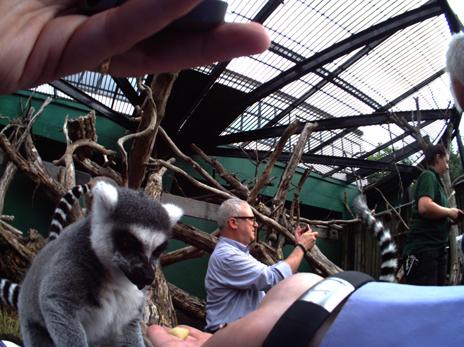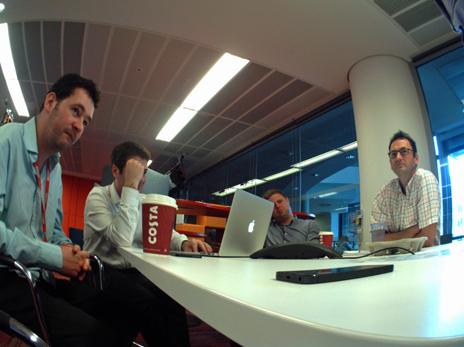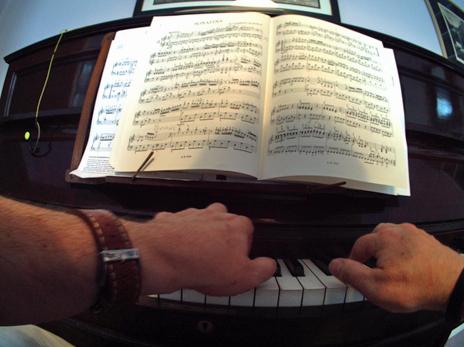Life with a wearable camera
- Published
- comments

Sometimes my job is altogether too much fun.
The other day, for instance, I found myself locked in a cage full of lemurs - and technology journalists - at London Zoo trying out a new gadget. The British company behind this launch deserves credit for its innovative ideas, both in the device and the launch - but the Autographer will make a lot of people feel uneasy.
The wearable camera, with which excitable journalists were getting shots of the lemurs, records still pictures everywhere you go, relying on five sensors to tell it when the scene has changed or something interesting may have happened.
It is the first consumer product made by OMG, an Oxford-based firm whose technology involves tracking human movement, and has built a solid business in motion-capture and other special effects for the film industry.
The firm acquired technology from Microsoft Research, which had designed the Sensecam, conceived as a "personal black box accident recorder". OMG decided to adapt this for use in medical care as a way for patients with brain damage and impaired memories to record the events of their day, and then discuss them with doctors to see how much they recalled. But the company started getting calls from people who said they were using it for other things - to capture photos at a music festival for instance.
Now, after a couple of years' work, it has been re-imagined as a consumer device, and one in a wearable tech industry that is suddenly very fashionable. I've used it for a couple of days, wearing it on a cord around my neck wherever I go.

"Everyone looks just slightly bored" - Rory captures the office meeting
What I've found is that the picture quality is pretty poor, especially in low light or with rapid movement, but that from time to time it does provide the kind of image you wouldn't capture on another camera. After a while you - and the people around you - forget that it is on.
So, amongst all the random shots of my desk at work or the streets along which I walk, there are images of me practising the piano, of a meeting at the office where everyone looks just slightly bored, of a colleague stopping at my desk to discuss a story. None of them posed, each giving an unfiltered glimpse of my day.
The best thing about the Autographer is the software that comes with it, which allows you to store and organise the vast amount of pictures you generate by date and location - and create time-lapse movies that give a kind of 1960s Super-8 feel to passing people and events.
But - and it is a big "but" - there are serious privacy issues raised by this gadget. We've got used to cameras pointing at us wherever we go, from CCTV to the smartphones held aloft everywhere from concerts to restaurants. But, as a little booklet that comes with the Autographer points out, this kind of device poses new challenges to the etiquette of social photography.

Rory practising piano
It tells users that it's polite to check with friends that they're happy to be photographed, to "pause image-capture if you are in close proximity to people you don't know for a long period of time, for example on a packed commuter train", and generally to "only use Autographer where it's acceptable to do so".
But are users really going to follow these rules? After all, the whole point of a life-logging camera like this - and others like the Memoto which is due to launch soon - is that they don't involve stopping and thinking before you take a picture. Otherwise you'd be better off using a superior camera.
And there is another big question mark over this device - the price. I can't believe many people are going to spend £400 for the pleasure of logging their life. After all, the Memoto promises something very similar for about half the price - although this Kickstarter-funded product has suffered a number of delays.
There is much to admire about the way OMG has developed this product - after all it is not often that a British company has the vision to bring a new piece of consumer technology to market. The firm says it has to charge a high price to recoup what has been a major investment - but it may now struggle to get the Autographer to a wide audience.